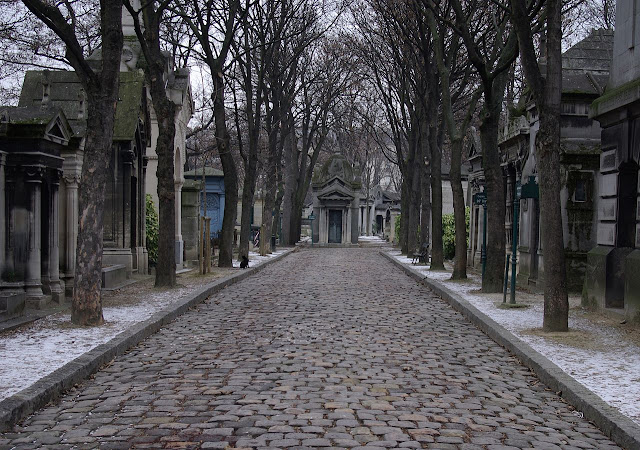 |
| Cimetière de Montmartre in Paris (Photo: Wikipedia) |
Au cimetièrère de Montmartre: Schumann, Berlioz, Lili Boulanger, Poulenc, Yvette Guibert, Charles Trenet; Julien Van Mellaerts, Alphonse Cemin; Wigmore Hall
Reviewed 17 November 2024
An imaginative trawl through the denizens of a Paris cemetery links together Heine, Berlioz, Boulanger and Poulenc in an engaging recital
Baritone Julien Van Mellaerts now lives in Paris, and not far from his home is Montmartre cemetery, and its denizens formed the theme of his recital at Wigmore Hall on Sunday 17 November 2024 with pianist Alphonse Cemin. Their programme linked an intriguingly diverse group of composers and poets, Schumann’s Dichterliebe, songs from Berlioz’ Les nuits d’été a song by Lili Boulanger, Poulenc’s Banalités and cabaret songs by Yvette Guibert and Charles Trenet.
We began with Schumann’s Dichterliebe, which sets poetry by Heinrich Heine who was buried in Montmartre in 1856. Heine lived in Paris from 1831, moving there partly because of the July Revolution of 1830 but also to escape German censorship, though Dichterliebe uses poetry from Heine’s Lyrisches Intermezzo published in 1823. It is worth pointing out that Schumann softened Heine’s edges and the poems are full of self-hatred and mockery.
Alphonse Cemin’s gentle, intimate piano eased us into the song cycle and throughout I enjoyed his way with Schumann, combining fluidity, clarity and intimacy. This complemented Van Mellaerts way with the songs, prioritising the text and allowing an element of the histrionic into his presentation without every feeling operatic.
The opening two songs occupied a poetic space, thoughtful and with sense of remembrance, emotion recollected in quietness. ‘Die Rose, die Lilie, die Taube, die Sonne’ was vividly vigorous, representing a sudden emotional change, but the initial poetic space returned. The strong opening of ‘Im Rhein, im heiligen Strome’ was completed with a serious, powerful postlude that led to the bitter resonance of ‘Ich grolle nicht’. The quiet intimacy returned with ‘Und wüßten’s die Blumen, die kleinen’ though here the emotions tumbled by, and we ended with real bitterness in ‘Das ist ein Flöten und Geigen’. Though ‘Hör’ ich das Liedchen klingen’ was bleak, there was magic in the spare textures the two performers created. Gentle remembrance, sorrow and a real sense of character unfolded over the next few songs, though ‘Ich hab’ im Traum geweinet’ also introduced an eerily threatening element. ‘Aus alten Märchen winkt es’ was vivid and vigorously, drawing on Van Mellaerts’ fine story-telling skills, whilst ‘Die alten, bösen Lieder’ had a slow build towards a powerful climax that unwound into quiet intensity and then a wonderfully consoling postlude from Cemin.
After this came two songs from Berlioz’ Les nuits d’été. Not only did Berlioz visit Heine in Paris but he too was buried in Montmartre cemetery. La spectre de la rose began with Van Mellaerts gently unfolding expressive phrasing, but he really opened out in the climaxes and Cemin’s sensitive piano playing meant we hardly missed the orchestra, then in the final section the two were mesmerising. L’ile inconnue really carried us away, with Van Mellaerts swagger complimented by Cemin’s impulsive piano, yet the narrative was full of engaging character.
Another denizen of the cemetery, Lili Boulanger’s song Attente sets a poem by Maurice Maeterlink, on whose work she was also basing her unfinished opera La Princesses Maleine. Attente proved to have a very distinctive atmosphere, with quiet intensity combined with a sense of world weariness.
Poulenc’s Banalités from 1940 sets a disparate group of poems by Guillaume Apollinaire. Chanson d’Orkenise was full of vivid character, the fine words delivered with a nice swagger. Hotel took us too a more serious, intimate place, world weariness combining with rich harmonies. Fagnes de Wallonie ;was a vivid patter song, with a great sense of story-telling. Then Voyage a Paris carried us away with engaging charm, before the rather serious Sanglots where Van Mellaerts really relished the rich resonance of Apollinaire’s language.
We ended on a slightly lighter note. Yvette Guilbert’s 1927 song, Je m’embrouille, another chattering song, words delivered at speed with a delightful sense of character and story telling. The contrasted with the gentle melancholy of Charles Trenet’s L’ame des poete from 1950, a cabaret song yet wonderfully subtle too.
There was an encore, too, Eric Maschwitz and Manning Sherwin’s A Nightingale Sang in Berkeley Square.
The blog is free, but I’d be delighted if you were to show your appreciation by buying me a coffee.
Elsewhere on this blog
- Letter from Florida: New World Symphony Veterans’ Day Concert, A World War II Journey with Lidiya Yankovskaya & Emily Magee – concert review
- Glorious performances from Rhian Lois and Thomas Atkins lift ENO’s new production of Donizetti’s The Elixir of Love – opera review
- Life enhancing: the Orchestra of the Age of Enlightenment in Bach’s Brandenburg Concertos – concert review
- By some strange piece of magic, it works: Dancing Queen from Asya Fateyeva & Lautten Compagney Berlin mixes Rameau with the songs of ABBA – record review
- Colour, movement and tradition: Juan Diego Florez in Offenbach’s The Tales of Hoffmann at Covent Garden – opera review
- Powerful intensity, youthful vigour: Benjamin Hulett & Helen Charlston in Handel’s Jephtha at in Wimbledon – concert review
- Much more than a guilty pleasure: the songs of Reynaldo Hahn at the London Song Festival – concert review
- The sound of wind, sunlight or water: pianist Anna Tsybuleva on her new recording of Debussy’s Préludes on Signum Classics – interview
- A bright beginning: Three Sonatas reveals the distinctive voice of young composer Sam Rudd-Jones in chamber music that intrigues – record review
- Provoking the inner senses: Mendelssohn’s Elijah in the majestic surroundings of King’s College Chapel, Cambridge – concert review
- Home









